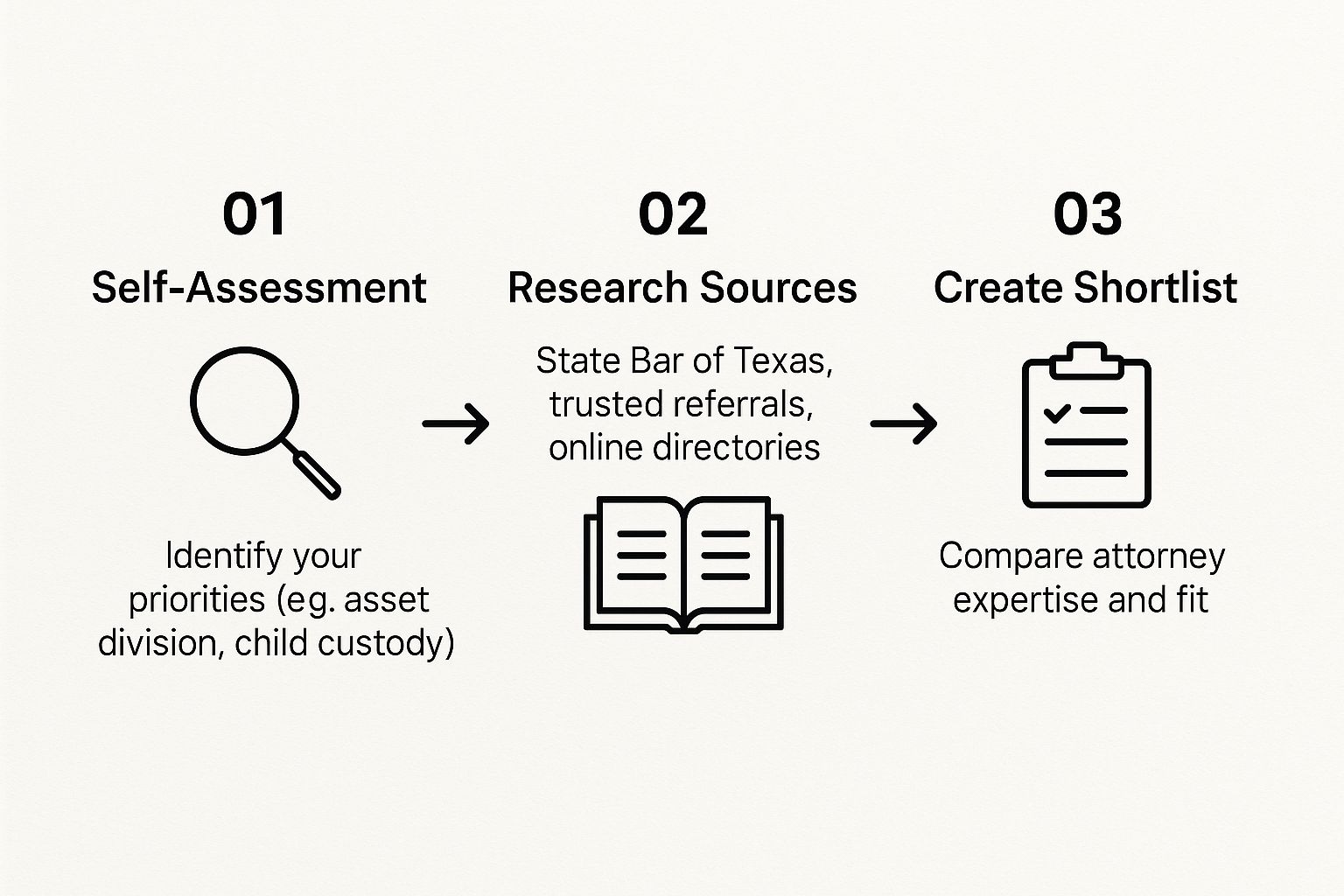That moment you realize divorce is inevitable can feel incredibly isolating. Your first, and arguably most critical, step toward protecting your future is choosing the right divorce lawyer, a decision that sets the foundation for your entire case, from how your property is divided to your long-term relationship with your children.
Finding the Right Legal Partner for Your Divorce

The lawyer you select becomes your advocate, your strategist, and your trusted guide through one of life's most challenging transitions. A great attorney’s role is to take the complex and often overwhelming legal process and turn it into a clear, actionable plan you can understand and feel confident about.
While Texas is a "no-fault" divorce state, the issues involved are rarely simple. The process demands a deep understanding of Texas law, and attempting to navigate it alone can be a costly mistake that impacts your family for years to come.
Navigating Texas Family Law with an Expert
An experienced Texas family law attorney does more than just file paperwork. They provide critical guidance on the intricate issues governed by the Texas Family Code, ensuring your rights are protected at every turn.
Here are a few key areas where their expertise is absolutely vital:
- Community Property Division: Under the Texas Family Code, most assets and debts acquired during your marriage belong to both of you as "community property." A skilled attorney ensures a "just and right" division of your marital estate, which can include your home, vehicles, investments, retirement accounts, and business interests.
- Child Custody and Support: For parents, nothing is more important than their children's well-being. A knowledgeable lawyer helps you establish a stable possession order (custody agreement) and correctly calculates child support according to Texas guidelines, always prioritizing your children's best interests.
- Spousal Maintenance: Determining if you qualify to receive—or might be required to pay—spousal maintenance (alimony) is a complex financial analysis. It requires a lawyer who understands the strict eligibility requirements set by Texas law.
The right lawyer makes a world of difference in managing both the legal and emotional complexities of divorce. Choosing an attorney who lives and breathes Texas family law is essential for a successful outcome.
This is one of the most significant decisions you will make. Recognizing the top mistakes to avoid when hiring a family lawyer can help you move forward with confidence. With the right professional by your side, you can face the future knowing you have a dedicated advocate fighting for you.
Clarifying Your Goals and Starting the Search
Before you begin calling attorneys, take a moment to get clear on what you want to achieve. The “best” divorce lawyer is entirely relative to your situation. The right attorney for a high-conflict custody battle is rarely the same one you’d hire to divide a complex portfolio of business assets.
Your specific circumstances—whether you are a parent, a business owner, or have a high-value estate—will dictate the kind of expertise you need.
This self-assessment is the single most important step you can take to save time, money, and frustration. You need to identify your non-negotiables. Is protecting your retirement account the top priority? Are you concerned about how your spouse’s business will be valued? Or is your main goal to create a peaceful, collaborative co-parenting plan?
Answering these questions gives your search purpose. It helps you zero in on professionals with the right experience. As you start thinking about your finances, a great first step is to begin gathering documents. You can learn how to easily obtain your bank statements, which will be vital for any lawyer you speak with.
Building Your Initial List of Candidates
Once you have your priorities straight, it's time to find qualified Texas family law attorneys. Instead of picking the first name you see online, use a multi-pronged approach to create a solid list of potential lawyers who specialize in cases just like yours.
A great place to start is the State Bar of Texas. Their website allows you to verify that an attorney is licensed and in good standing. Even better, you can specifically look for lawyers who are Board Certified in Family Law by the Texas Board of Legal Specialization. This is a rigorous certification that signals a high level of expertise and dedication to family law.
Your personal network can also be a valuable resource. Ask trusted friends, family, or other professionals like your CPA or therapist for recommendations. A referral can give you priceless insight into an attorney's communication style and effectiveness. Just be sure their case had similar complexities to yours.
Finally, reputable online legal directories can help you compare attorneys, read client reviews, and get a sense of a law firm's focus.
This visual guide breaks down how to refine what you need and find the right people to interview.

As the infographic lays out, a methodical approach ensures you're not just finding any lawyer. You're finding the right lawyer for you.
Attorney Specialization Checklist
Divorce isn't one-size-fits-all, and neither is legal expertise. Use this checklist to pinpoint the skills your situation demands.
| Your Situation | Required Legal Expertise | Why It Matters in Texas |
|---|---|---|
| We own a business together. | Business Valuation, Forensic Accounting | Texas is a community property state. Properly valuing and dividing a business is complex and requires specialized financial knowledge to ensure a just and right division. |
| I'm a stay-at-home parent. | Spousal Maintenance, Child Support Calculation | Securing your financial future and ensuring child support is calculated correctly is critical. An expert knows the nuances of Texas law and how to advocate for you. |
| My spouse is hiding assets. | Asset Tracing, Discovery Motions | You need an aggressive attorney who knows how to use legal tools to uncover hidden income, investments, or property to protect your share of the marital estate. |
| We have a special needs child. | Special Needs Trusts, Long-Term Support Planning | Standard child support may not be enough. You need an attorney who can structure a plan that provides for your child's unique needs into adulthood. |
| There is a history of abuse. | Protective Orders, High-Conflict Litigation | Your safety is paramount. This requires an attorney experienced in handling domestic violence cases and navigating the court system for your protection. |
| We have significant retirement accounts. | QDROs (Qualified Domestic Relations Orders) | Dividing retirement accounts like 401(k)s and pensions requires specific legal orders. A mistake here can be financially devastating. |
This list highlights why finding an attorney with a proven track record in your specific area of need is crucial for a successful outcome.
Focus on True Family Law Specialists
This is critical: hire an attorney who dedicates their practice to family law. A general practitioner who handles various legal matters will not have the deep, up-to-the-minute knowledge of the Texas Family Code that your case demands.
Divorce and custody issues are governed by a distinct set of laws and court procedures. An attorney who lives and breathes Texas family law will be familiar with local judges, opposing counsel, and strategies that are effective in your specific county’s court system.
When you hire a specialist, you're not just paying for their time; you're investing in their pattern recognition. They’ve handled cases like yours hundreds of times. They can anticipate roadblocks, propose proven strategies, and give you the confident, straightforward advice you need.
Making the Most of Your Initial Consultation

The first meeting with a potential divorce lawyer is your best chance to take control of the hiring process. This is an interview where you are in charge. It's your opportunity to look past the website and determine if an attorney has the right experience, strategy, and personality to champion your case.
Walking into that meeting prepared is key. It transforms nervous energy into focused action, ensuring you leave with the answers needed to make a solid, confident decision. When you know what to ask and what to look for, you can quickly tell if a lawyer is the right fit.
Strategic Questions to Get Real Answers
You need to know how an attorney thinks, operates, and whether their philosophy aligns with your goals. The right questions will give you a genuine glimpse into their capabilities. A free consultation can help you choose the right divorce attorney when you show up ready to dig deep.
Go beyond the basics with these strategic prompts:
About Their Experience:
- "What percentage of your practice is dedicated to Texas family law?"
- "Can you describe your experience with cases involving [your specific issue, e.g., business valuation, high-conflict custody] here in [Your County]?"
- "Who will be the lead attorney on my case, and who will be my main point of contact?"
About Their Strategy:
- "Based on what I've shared, what do you see as the biggest challenges in my case, and what is your initial strategic approach?"
- "What is your philosophy on negotiation and mediation versus going to trial? How do you decide which path to take?"
- "How do you typically communicate with the opposing attorney? Is your style more collaborative or aggressive?"
About Communication and Process:
- "What is your firm's policy on returning calls and emails? What is a realistic response time I can expect?"
- "How will I be kept informed about my case's progress?"
- "Can you walk me through the typical steps of a Texas divorce, from filing the Original Petition to the Final Decree of Divorce?"
Pay close attention not just to what they say, but how they say it. A seasoned attorney should be able to answer these questions with confidence and clarity, using specific examples rather than vague assurances.
Critical Red Flags to Watch For
Just as important as asking good questions is knowing how to spot warning signs. Your first meeting can reveal a lot about an attorney’s professionalism and focus.
Be wary of any attorney who guarantees a specific outcome. An ethical lawyer can discuss potential strategies and likely scenarios, but they will never make promises about a judge's decision. Such guarantees are not only unrealistic but also a major ethical red flag.
Here are other signs that an attorney may not be the right fit for you:
- Vague or Evasive Answers: If the lawyer can't clearly explain their strategy or dodges questions about their experience, they may lack the specific expertise you need.
- A High-Pressure Sales Pitch: You should feel informed, not cornered. An attorney who seems more focused on getting you to sign a retainer than on listening to your story may not put your needs first.
- Lack of Empathy or Dismissiveness: Your concerns are valid. If an attorney seems impatient, talks down to you, or brushes off your worries, they won’t be the supportive advocate you need.
- Disorganized Office or Demeanor: A chaotic office or an unprepared lawyer can indicate how they will manage the critical details of your case.
Ultimately, trust your gut. The relationship with your attorney is built on confidence and trust. If something feels off, it’s better to keep looking. This meeting is your best tool for finding a legal partner who will protect your family and your future with competence and care.
Understanding Legal Fees in a Texas Divorce
The financial aspect of hiring a lawyer can feel intimidating, but a clear understanding of how attorneys charge for their time empowers you to make a smart decision.
In Texas, family law attorneys most commonly use an hourly rate. You pay for the actual time your attorney and their team—like paralegals—spend working on your case. This includes everything from drafting court documents and responding to emails to representing you in mediation or court.
Some lawyers may offer a flat fee for simple, uncontested divorces where both spouses agree on all terms from the start. However, this is less common for cases with any level of disagreement.
Decoding the Retainer Agreement
Your financial relationship with a lawyer will typically start with a retainer. Think of this as a down payment for legal services. You pay a lump sum upfront, which the law firm holds in a special trust account. As your legal team works, they bill their time against that retainer.
Once the funds run low, the firm will request that you replenish the retainer. This is often called an "evergreen" retainer, and it ensures your case can proceed without interruption.
Before you sign anything, the attorney must provide you with a detailed retainer agreement. This contract should spell out everything in plain English.
Make sure it clearly lists:
- The hourly rates for every person who may work on your case (attorneys, paralegals, etc.).
- The amount of the initial retainer.
- The firm’s billing policies, including how often you will receive invoices (typically monthly).
- A clear description of the legal services covered.
A transparent, easy-to-understand fee agreement is the hallmark of a professional and trustworthy law firm. Never feel hesitant to ask for clarification on any part of the contract before you sign.
Being smart about legal costs starts with asking direct questions. For a deeper dive, our guide on exploring the average costs of hiring a divorce lawyer and the factors that influence fees breaks it all down. Being organized with your communications, such as saving non-urgent questions for a single email, can also help manage costs effectively.
Here’s a quick breakdown of the common fee structures you'll encounter when looking for a divorce attorney in Texas.
Comparing Attorney Fee Structures
A breakdown of the most common ways divorce lawyers in Texas bill for their services, helping you understand what to expect.
| Fee Type | How It Works | Best For |
|---|---|---|
| Hourly Rate | The attorney bills for every hour (or fraction of an hour) spent on your case. This is the most common model in family law. | Contested or complex divorces where the total time needed is unpredictable. |
| Flat Fee | A single, fixed price for a specific, well-defined legal service. | Simple, uncontested divorces where both parties are in complete agreement from the start. |
| Retainer Fee | An upfront payment that the law firm holds in trust. The attorney's hourly fees are then billed against this amount. | Most divorce cases. It acts as a deposit to secure the lawyer's services and cover initial work. |
Understanding these options will help you ask the right questions during your consultations and choose a lawyer whose billing practices align with your expectations.
Making Your Final Decision with Confidence
You’ve completed your consultations. Now comes the moment of decision—choosing the person who will stand beside you.

This is a deeply personal choice that goes beyond an impressive resume. You are not just hiring legal expertise; you are choosing a partner who will guide you through a vulnerable time. The goal is to find someone who not only knows the Texas Family Code but also understands you and your goals.
Evaluating Your Top Candidates
It’s time to compare your top candidates. Create a simple pros-and-cons list to clarify your thoughts and focus on what truly matters for your situation.
- Specific Expertise: Did one lawyer demonstrate a deeper understanding of the key issues in your divorce, such as dividing a family business or navigating a high-conflict custody dispute? That specialized knowledge is invaluable.
- Communication Style: Whose approach felt right for you? Some people prefer a direct, no-nonsense attorney, while others need someone who takes the time to explain the emotional and legal aspects of the process.
- Strategic Alignment: Did their proposed strategy align with your goals? If you want to resolve matters amicably through mediation, hiring a lawyer who defaults to aggressive litigation might create unnecessary conflict and expense.
The right choice is more significant than ever. With how divorce trends affect legal needs on legalzoom.com showing more complex financial situations, you need a lawyer skilled in handling modern, intricate cases involving high-value estates and long-term parenting plans.
Trusting Your Intuition
After your logical analysis, check in with your gut. Credentials and experience are critical, but your comfort level is just as important. You will be sharing private details of your life with this person and trusting them to advocate for your future.
You must feel heard, respected, and confident in your attorney’s ability to represent you. If your intuition is telling you that a particular lawyer isn’t the one, listen. That feeling is often your most reliable guide.
Your final choice should be a balance of objective qualifications and a strong personal connection. The right lawyer empowers you, bringing clarity and direction to turn your uncertainty into a solid plan.
3 Pillars for Choosing Your Texas Divorce Lawyer
Your final decision should rest on three pillars: proven expertise in your specific legal issues, a strategic approach that matches your desired outcome, and a personal connection that builds trust and confidence. Find the lawyer who checks all three boxes, and you will be in a strong position to face what comes next.
What to Do Next
You now know what separates a great Texas divorce lawyer from a mediocre one. The next step is yours to take.
Your goal is to find a partner—someone who listens, understands your goals, and has the expertise to help you achieve them. This process is about laying the groundwork for the next chapter of your life. As you move forward, remember to consider how major life changes like divorce impact your taxes, a critical piece of your long-term financial health.
The best way to know if an attorney is the right fit is to talk to them. You don’t have to figure this all out on your own. At The Law Office of Bryan Fagan, PLLC, we help Texas families navigate divorce with empathy and confidence. We invite you to Schedule a free, confidential consultation with our team today to get the personalized advice and support you deserve.
A Few Common Questions We Hear About Hiring a Divorce Lawyer
Choosing a lawyer is a big decision, and it’s natural to have questions. Here are some straightforward answers to the concerns we hear most often from Texans starting this process.
Do I Really Need a Lawyer for My Divorce in Texas?
Legally, you can represent yourself (pro se), but this is a significant risk, especially if you have children, property, or shared debts. The Texas Family Code is complex, and a single mistake can lead to financial or personal consequences that are nearly impossible to reverse.
An experienced lawyer protects your rights, ensures paperwork is filed correctly, and prevents you from agreeing to an unfair settlement. Even in an amicable divorce, an attorney ensures your final decree is solid, enforceable, and protects your future.
What’s the Difference Between a Mediator and My Own Lawyer?
This is a great question because their roles are completely different.
A mediator is a neutral third party who does not work for you or your spouse. Their job is to facilitate communication and help you both find common ground to reach an agreement.
Your divorce lawyer is 100% on your side. Their duty is to advocate for you, provide legal advice based on your best interests, and fight for your rights during negotiations. While mediation is required in most Texas divorces, you should never attend without your own attorney to advise you and ensure any agreement is fair.
How Soon Should I Talk to a Divorce Lawyer?
You should contact an attorney as soon as you begin seriously considering divorce—even if you haven’t discussed it with your spouse. Early legal advice is a game-changer.
An initial consultation arms you with crucial information. An attorney can explain your rights, outline the divorce process, and provide guidance on steps to protect yourself, your children, and your finances before any paperwork is filed. This proactive approach can set you up for a much better, more predictable outcome.
Answering these initial questions is the first step toward clarity and control. The next is getting advice specific to your unique situation. At the Law Office of Bryan Fagan, PLLC, we’re here to provide the compassionate, clear guidance you need to protect your family and your future. Schedule a free, confidential consultation with our team today to learn how we can help.








